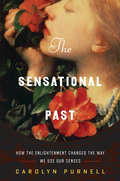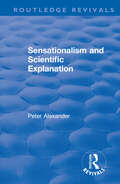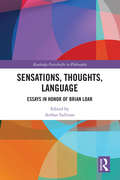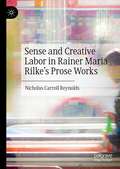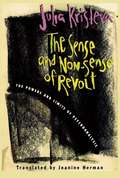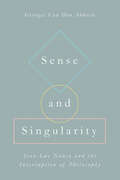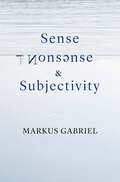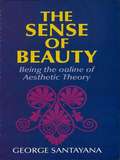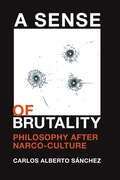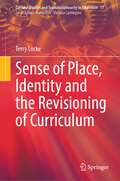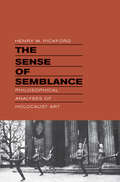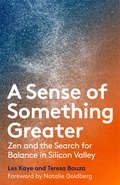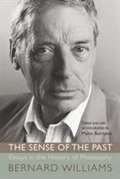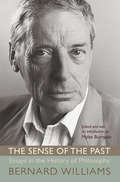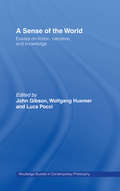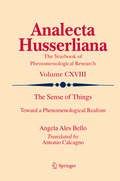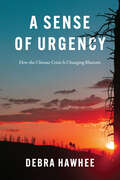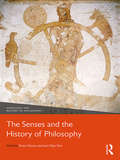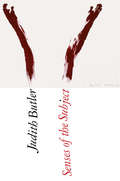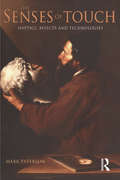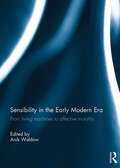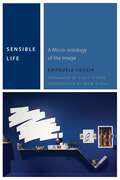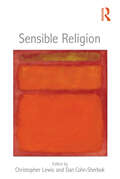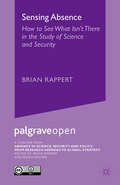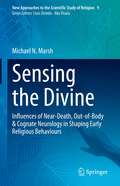- Table View
- List View
The Sensational Past: How the Enlightenment Changed the Way We Use Our Senses
by Carolyn PurnellSight, smell, hearing, taste, and touch—as they were celebrated during the Enlightenment and as they are perceived today. Blindfolding children from birth? Playing a piano made of live cats? Using tobacco to cure drowning? Wearing “flea”-colored clothes? These actions may seem odd to us, but in the eighteenth century, they made perfect sense. As often as we use our senses, we rarely stop to think about their place in history. But perception is not dependent on the body alone. Carolyn Purnell persuasively shows that, while our bodies may not change dramatically, the way we think about the senses and put them to use has been rather different over the ages. Journeying through the past three hundred years, Purnell explores how people used their senses in ways that might shock us now. And perhaps more surprisingly, she shows how many of our own ways of life are a legacy of this earlier time. The Sensational Past focuses on the ways in which small, peculiar, and seemingly unimportant facts open up new ways of thinking about the past. You will explore the sensory worlds of the Enlightenment, learning how people in the past used their senses, understood their bodies, and experienced the rapidly shifting world around them. In this smart and witty work, Purnell reminds us of the value of daily life and the power of the smallest aspects of existence using culinary history, fashion, medicine, music, and many other aspects of Enlightenment life.
Sensationalism and Scientific Explanation (Routledge Revivals)
by Peter AlexanderSensationalism and Scientific Explanation is a critical examination of the view that scientific statements can be understood only in terms of basic ‘atoms’ of experience, also called ‘sensations’. Presenting different extremes of this view, the book considers whether it can provide an adequate account of science as we find it. It explores in detail the sensationalist account of science set out by Ernst Mach in relation to various aspects of scientific investigation and theorizing, and puts forward an argument for the ‘inherent weakness of sensationalism’. Sensationalism and Scientific Explanation will appeal to those with an interest in the history and philosophy of science.
Sensations, Thoughts, Language: Essays in Honour of Brian Loar (Routledge Festschrifts in Philosophy)
by Arthur SullivanBrian Loar (1939-2014) was an eminent and highly respected philosopher of mind and language. He was at the forefront of several different field-defining debates between the 1970s and the 2000s—from his earliest work on reducing semantics to psychology, through debates about reference, functionalism, externalism, and the nature of intentionality, to his most enduringly influential work on the explanatory gap between consciousness and neurons. Loar is widely credited with having developed the most comprehensive functionalist account of certain aspects of the mind, and his ‘phenomenal content strategy’ is arguably one of the most significant developments on the ancient mind/body problem. This volume of essays honours the entirety of Loar’s wide-ranging philosophical career. It features sixteen original essays from influential figures in the fields of philosophy of language and philosophy of mind, including those who worked with and were taught by Loar. The essays are divided into three thematic sections covering Loar’s work in philosophy of language, especially the relations between semantics and psychology (1970s-80s), on content in the philosophy of mind (1980s-90s), and on the metaphysics of intentionality and consciousness (1990s and beyond). Taken together, this book is a fitting tribute to one of the leading minds of the latter-20th century, and a timely reflection on Loar’s enduring influence on the philosophy of mind and language.
Sense and Creative Labor in Rainer Maria Rilke's Prose Works
by Nicholas Carroll ReynoldsThis book is an investigation of the role of creative labor and the five senses in Rainer Maria Rilke’s prose works, including his “Primal Sound” essay, the Stories of God, The Notebooks of Malte Laurids Brigge, and his monograph on Auguste Rodin. It is about several protagonists’ quest to achieve creative labor by reconnecting spirit or the unconscious to the hand. There are many difficulties in the way, however, illustrated by Rilke’s essays, tales, and monographs. In the process of overcoming these impediments, the five senses are expanded and refined. Rilke’s characters undergo a transformation that not only allows them to do true creative labor, but also brings them into a new relationship with themselves, the world around them and other people.Nicholas Carroll Reynolds received his PhD at the University of Oregon, USA. He has authored several articles on philosophy and literature, and has worked as an editor and translator. He is currently employed at Trinity University in San Antonio, Texas, USA, where he teaches in the German, Philosophy, and First Year Experience programs, as well as in Trinity’s Study abroad program in Berlin, Germany.
The Sense and Non-Sense of Revolt: The Powers and Limits of Psychoanalysis (European Perspectives: A Series in Social Thought and Cultural Criticism)
by Julia KristevaLinguist, psychoanalyst, and cultural theorist, Julia Kristeva is one of the most influential and prolific thinkers of our time. Her writings have broken new ground in the study of the self, the mind, and the ways in which we communicate through language. Her work is unique in that it skillfully brings together psychoanalytic theory and clinical practice, literature, linguistics, and philosophy.In her latest book on the powers and limits of psychoanalysis, Kristeva focuses on an intriguing new dilemma. Freud and psychoanalysis taught us that rebellion is what guarantees our independence and our creative abilities. But in our contemporary "entertainment" culture, is rebellion still a viable option? Is it still possible to build and embrace a counterculture? For whom—and against what—and under what forms?Kristeva illustrates the advances and impasses of rebel culture through the experiences of three twentieth-century writers: the existentialist John Paul Sartre, the surrealist Louis Aragon, and the theorist Roland Barthes. For Kristeva the rebellions championed by these figures—especially the political and seemingly dogmatic political commitments of Aragon and Sartre—strike the post-Cold War reader with a mixture of fascination and rejection. These theorists, according to Kristeva, are involved in a revolution against accepted notions of identity—of one's relation to others. Kristeva places their accomplishments in the context of other revolutionary movements in art, literature, and politics. The book also offers an illuminating discussion of Freud's groundbreaking work on rebellion, focusing on the symbolic function of patricide in his Totem and Taboo and discussing his often neglected vision of language, and underscoring its complex connection to the revolutionary drive.
Sense and Singularity: Jean-Luc Nancy and the Interruption of Philosophy
by Georges Van Den AbbeelePhilosophical thinking is interrupted by the finitude of what cannot be named, on the one hand, and that within which it is subsumed as one of multiple modes of sense-making, on the other. Sense and Singularity elaborates Jean-Luc Nancy’s philosophical project as an inquiry into the limits or finitude of philosophy itself, where it is interrupted, and as a practice of critical intervention where philosophy serves to interrupt otherwise unquestioned ways of thinking. Nancy’s interruption of philosophy, Van Den Abbeele argues, reveals the limits of what philosophy is and what it can do, its apocalyptic end and its endless renewal, its Sisyphean interruption between the bounds of infinitely replicating sense and the conceptual vanishing point that is singularity. In examinations of Nancy’s foundational rereading of Descartes's cogito as iterative, his formal experimentations with the genres of philosophical writing, the account of “retreat” in understanding the political, and the interruptive play of sense and singularity in writings on the body, sexuality, and aesthetics, Van Den Abbeele offers a fresh account of one of our major thinkers as well as a provocative inquiry into what philosophy can do.
Sense, Nonsense, and Subjectivity
by Markus GabrielA leading German philosopher offers his most ambitious work yet on the nature of knowledge, arguing that being wrong about things defines the human condition.For millennia, philosophers have dedicated themselves to advancing understanding of the nature of truth and reality. In the process they have amassed a great deal of epistemological theory—knowledge about knowledge. But negative epistemological phenomena, such as ignorance, falsity, illusion, and delusion, are persistently overlooked. This is surprising given that we all know how fallible humans are.Sense, Nonsense, and Subjectivity replies with a theory of false thought, demonstrating that being wrong about things is part and parcel of subjectivity itself. For this reason, knowledge can never be secured without our making claims that can always, in principle, be wrong. Even in successful cases, where we get something right and thereby gain knowledge, the possibility of failure lingers with us. Markus Gabriel grounds this argument in a novel account of the relationship between sense, nonsense, and subjectivity—phenomena that hang together in the temporal unfolding of our cognitive lives.While most philosophers continue to theorize subjectivity in terms of conscious self-representation and the supposedly infallible grip we have on ourselves as thinkers, Sense, Nonsense, and Subjectivity addresses the age-old Platonic challenge to understand situations in which we do not get reality right. Adding a stimulating perspective on epistemic failures to the work of New Realism, Gabriel addresses long-standing ontological questions in an age where the line between the real and the fake is increasingly blurred.
The Sense of Beauty: Being the Outline of Aesthetic Theory
by George SantayanaIt is remarkably appropriate that this work on aesthetics should have been written by George Santayana, who is probably the most brilliant philosophic writer and the philosopher with the strongest sense of beauty since Plato. It is not a dry metaphysical treatise, as works on aesthetics so often are, but is itself a fascinating document: as much a revelation of the beauty of language as of the concept of beauty.This unabridged reproduction of the 1896 edition of lectures delivered at Harvard College is a study of "why, when, and how beauty appears, what conditions an object must fulfill to be beautiful, what elements of our nature make us sensible of beauty, and what the relation is between the constitution of the object and the excitement of our susceptibility."Santayana first analyzes the nature of beauty, finding it irrational, "pleasure regarded as the quality of a thing." He then proceeds to the materials of beauty, showing what all human functions can contribute: love, social instincts, senses, etc. Beauty of form is then analyzed, and finally the author discusses the expression of beauty. Literature, religion, values, evil, wit, humor, and the possibility of finite perfection are all examined. Presentation throughout the work is concrete and easy to follow, with examples drawn from art, history, anthropology, psychology, and similar areas.
A Sense of Brutality: Philosophy after Narco-Culture
by Carlos Alberto SánchezContemporary popular culture is riddled with references to Mexican drug cartels, narcos, and drug trafficking. In the United States, documentary filmmakers, journalists, academics, and politicians have taken note of the increasing threats to our security coming from a subculture that appears to feed on murder and brutality while being fed by a romanticism about power and capital. Carlos Alberto Sánchez uses Mexican narco-culture as a point of departure for thinking about the nature and limits of violence, culture, and personhood. A Sense of Brutality argues that violent cultural modalities, of which narco-culture is but one, call into question our understanding of “violence” as a concept. The reality of narco-violence suggests that “violence” itself is insufficient to capture it, that we need to redeploy and reconceptualize “brutality” as a concept that better captures this reality. Brutality is more than violence, other to cruelty, and distinct from horror and terror—all concepts that are normally used interchangeably with brutality, but which, as the analysis suggests, ought not to be. In narco-culture, the normalization of brutality into everyday life is a condition upon which the absolute erasure or derealization of people is made possible. "The study is original, bringing a wide range of voices into dialogue to present a problem that is pressing and deserving of careful analysis. The study will contribute to the field of Latin American philosophy in important ways... This is the only book by a philosopher on the topic of narco-culture, and I think it’s an important contribution to a topic that should be addressed by philosophers." —Elizabeth Millán, DePaul University
Sense of Place, Identity and the Revisioning of Curriculum (Cultural Studies and Transdisciplinarity in Education #17)
by Terry LockeThis book explores intersections between sense of place, the formation of identity, indigeneity and colonisation, literature and literary study, the arts, and a revisioned school curriculum for the Anthropocene. Underpinning the book is a conviction that sense of place is central to the fostering of the change of heart required to secure the survival of human life on earth. It offers a coherent overview of seemingly disparate realities on a geographically and historically sprawling canvas. The book is a work of literary non-fiction, drawing on a range of sources: literary works and criticism, theoretical research, empirical studies and artworks. Of its very nature, the book enacts an extensive cultural critique. After establishing a cross-disciplinary foundation for “sense of place”, the book describes its relationship to identity with reference to such terms as attachment, dispossession, reclamation and representation. It shows how a hopeful narrative for planet stewardship can be developed by the uptake of indigenous and traditional discourses of place. It concludes with the envisioning of a place-conscious curriculum, and ways in which an activist agenda might be pursued in the Anthropocene.
The Sense of Semblance: Philosophical Analyses of Holocaust Art
by Henry W. PickfordThe Sense of Semblance is the first book to incorporate contemporary analytic philosophy in interpretations of art and architecture, literature, and film about the Holocaust. The book’s principal aim is to move beyond the familiar debates surrounding postmodernism by demonstrating the usefulness of alternative theories of meaning and understanding from the Anglophone analytic tradition. The book takes as its starting point the claim that Holocaust artworks must fulfill at least two specific yet potentially reciprocally countervailing desiderata: they must meet aesthetic criteria (lest they be, say, merely historical documents) and they must meet historical criteria (they must accurately represent the Holocaust, lest they be merely artworks). I locate this problematic within the tradition of philosophical aesthetics, as a version of the conflict between aesthetic autonomy and aesthetic heteronomy, and claim that Theodor W. Adorno’s “dialectic of aesthetic semblance” describes the normative demand that a successful artwork maintain a dynamic tension between these dual desiderata. While working within a framework inspired by Adorno, the book further claims that certain concepts and lines of reasoning from contemporary philosophy best explicate how individual artworks fulfill these dual desiderata, including the causal theory of names, the philosophy of tacit knowledge, analytic philosophy of quotation, Sartre’s theory of the imaginary, work in the epistemology of testimony, and Walter Benjamin’s theory of dialectical images. Individual chapters provide close readings of lyric poetry by Paul Celan (including a critique of Derridean deconstruction), Holocaust memorials in Berlin, texts by the Austrian quotational artist Heimrad Bäcker, Claude Lanzmann’s film Shoah and Art Spiegelman’s graphic novel Maus. The result is a set of interpretations of Holocaust artworks that, in their precision, specificity and clarity, inaugurate a dialogue between contemporary analytic philosophy and contemporary art.
A Sense of Something Greater: Zen and the Search for Balance in Silicon Valley
by Les Kaye Teresa Bouza Natalie GoldbergWelcome to Silicon Valley’s search for fulfillment and purpose beyond devices, money, and power. With worker stress at an all-time high, particularly in the fast-paced technology industry, it’s no surprise that Google, Salesforce, and Apple have adopted mindfulness and meditation into their workplace culture. Studies show mindfulness practice increases emotional intelligence, reduces stress, and enhances health and overall well-being. A Sense of Something Greater goes deeper than the current mindfulness trend, into the heart of Zen practice. For Les Kaye, Zen is more than awareness––it’s also “the continued determination to be authentic in relationships, to create meaningful, intimate, intentional bonds with people, things, and the environment.” Kaye’s teachings are paired with interviews with current tech employees and Zen practitioners, conducted by journalist Teresa Bouza. A Sense of Something Greater is an essential book for business leaders, mindfulness meditators, and Zen practitioners alike.
The Sense of the Past
by Bernard WilliamsBefore his death in 2003, Bernard Williams planned to publish a collection of historical essays, focusing primarily on the ancient world. This posthumous volume brings together a much wider selection, written over some forty years. His legacy lives on in this masterful work, the first collection ever published of Williams's essays on the history of philosophy. The subjects range from the sixth century B.C. to the twentieth A.D., from Homer to Wittgenstein by way of Socrates, Plato, Aristotle, Descartes, Hume, Sidgwick, Collingwood, and Nietzsche. Often one would be hard put to say which part is history, which philosophy. Both are involved throughout, because this is the history of philosophy written philosophically. Historical exposition goes hand in hand with philosophical scrutiny. Insights into the past counteract blind acceptance of present assumptions. In his touching and illuminating introduction, Myles Burnyeat writes of these essays: "They show a depth of commitment to the history of philosophy seldom to be found nowadays in a thinker so prominent on the contemporary philosophical scene." The result celebrates the interest and importance to philosophy today of its near and distant past. The Sense of the Past is one of three collections of essays by Bernard Williams published by Princeton University Press since his death. In the Beginning Was the Deed: Realism and Moralism in Political Argument, selected, edited, and with an introduction by Geoffrey Hawthorn, and Philosophy as a Humanistic Discipline, selected, edited, and with an introduction by A. W. Moore, make up the trio.
The Sense of the Past: Essays in the History of Philosophy
by Bernard WilliamsBefore his death in 2003, Bernard Williams planned to publish a collection of historical essays, focusing primarily on the ancient world. This posthumous volume brings together a much wider selection, written over some forty years. His legacy lives on in this masterful work, the first collection ever published of Williams's essays on the history of philosophy. The subjects range from the sixth century B.C. to the twentieth A.D., from Homer to Wittgenstein by way of Socrates, Plato, Aristotle, Descartes, Hume, Sidgwick, Collingwood, and Nietzsche. Often one would be hard put to say which part is history, which philosophy. Both are involved throughout, because this is the history of philosophy written philosophically. Historical exposition goes hand in hand with philosophical scrutiny. Insights into the past counteract blind acceptance of present assumptions. In his touching and illuminating introduction, Myles Burnyeat writes of these essays: "They show a depth of commitment to the history of philosophy seldom to be found nowadays in a thinker so prominent on the contemporary philosophical scene." The result celebrates the interest and importance to philosophy today of its near and distant past. The Sense of the Past is one of three collections of essays by Bernard Williams published by Princeton University Press since his death. In the Beginning Was the Deed: Realism and Moralism in Political Argument, selected, edited, and with an introduction by Geoffrey Hawthorn, and Philosophy as a Humanistic Discipline, selected, edited, and with an introduction by A. W. Moore, make up the trio.
A Sense of the World: Essays on Fiction, Narrative, and Knowledge (Routledge Studies in Contemporary Philosophy)
by John Gibson Wolfgang Huemer Luca PocciA team of leading contributors from both philosophical and literary backgrounds have been brought together in this impressive book to examine how works of literary fiction can be a source of knowledge. Together, they analyze the important trends in this current popular debate. The innovative feature of this volume is that it mixes work by literary theorists and scholars with work of analytic philosophers that combined together provide a comprehensive statement of the variety of ways in which works of fiction can engage questions of worldly interest. It uses the problem of cognitive value to explore: literature’s contribution to ethical life literature’s ability to engage in social and political critique the role narrative plays in opening up possibilities of moral, aesthetic, experience and selfhood This remarkable volume will attract the attention of both literature and philosophy scholars with its statement of the various ways that literature and life take an interest in one another.
The Sense of Things
by Angela Ales BelloThis book proposes a new interpretative key for reading and overcoming the binary of idealism and realism. It takes as its central issue for exploration the way in which human consciousness unfolds, i. e. , through the relationship between the I and the world--a field of phenomenological investigation that cannot and must not remain closed within the limits of its own disciplinary borders. The book focuses on the question of realism in contemporary debates, ultimately dismantling prejudices and automatisms that one finds therein. It shows that at the root of the controversy between realism and idealism there often lie equivocations of a semantic nature and by going back to the origins of modern phenomenology it puts into play a discussion of the Husserlian concept of transcendental idealism. Following this path and neutralizing the extreme positions of a critical idealism and a naïve realism, the book proposes a "transcendental realism": the horizon of a dynamic unity that embraces the process of cognition and that grounds the relation, and not the subordination, of subject and object. The investigation of this reciprocity allows the surpassing of the limits of the domain of knowing, leading to fundamental questions surrounding the ultimate sense of things and their origin.
A Sense of Urgency: How the Climate Crisis Is Changing Rhetoric
by Debra HawheeA study of how the climate crisis is changing human communication from a celebrated rhetorician. Why is it difficult to talk about climate change? Debra Hawhee argues that contemporary rhetoric relies on classical assumptions about humanity and history that cannot conceive of the present crisis. How do we talk about an unprecedented future or represent planetary interests without privileging our own species? A Sense of Urgency explores four emerging answers, their sheer novelty a record of both the devastation and possible futures of climate change. In developing the arts of magnitude, presence, witness, and feeling, A Sense of Urgency invites us to imagine new ways of thinking with our imperiled planet.
The Senses and the History of Philosophy (Rewriting the History of Philosophy)
by Brian Glenney José Filipe SilvaThe study of perception and the role of the senses have recently risen to prominence in philosophy and are now a major area of study and research. However, the philosophical history of the senses remains a relatively neglected subject. Moving beyond the current philosophical canon, this outstanding collection offers a wide-ranging and diverse philosophical exploration of the senses, from the classical period to the present day. Written by a team of international contributors, it is divided into six parts: Perception from Non-Western Perspectives Perception in the Ancient Period Perception in the Medieval Latin/Arabic Period Perception in the Early Modern Period Perception in the Post-Kantian Period Perception in the Contemporary Period. The volume challenges conventional philosophical study of perception by covering a wide range of significant, as well as hitherto overlooked, topics, such as perceptual judgment, temporal and motion illusions, mirror and picture perception, animal senses and cross-modal integration. By investigating the history of the senses in thinkers such as Plotinus, Auriol, Berkeley and Cavendish; and considering the history of the senses in diverse philosophical traditions, including Chinese, Indian, Byzantine, Greek and Latin it brings a fresh approach to studying the history of philosophy itself. Including a thorough introduction as well as introductions to each section by the editors, The Senses and the History of Philosophy is essential reading for students and researchers in the history of philosophy, perception, philosophy of mind, philosophical psychology, aesthetics and eastern and non-western philosophy. It will also be extremely useful for those in related disciplines such as psychology, religion, sociology, intellectual history and cognitive sciences.
Senses of the Subject
by Judith ButlerThis book brings together a group of Judith Butler’s philosophical essays written over two decades that elaborate her reflections on the roles of the passions in subject formation through an engagement with Hegel, Kierkegaard, Descartes, Spinoza, Malebranche, Merleau-Ponty, Freud, Irigaray, and Fanon. Drawing on her early work on Hegelian desire and her subsequent reflections on the psychic life of power and the possibility of self-narration, this book considers how passions such as desire, rage, love, and grief are bound up with becoming a subject within specific historical fields of power.Butler shows in different philosophical contexts how the self that seeks to make itself finds itself already affected and formed against its will by social and discursive powers. And yet, agency and action are not necessarily nullified by this primary impingement. Primary sense impressions register this dual situation of being acted on and acting, countering the idea that acting requires one to overcome the situation of being affected by others and the linguistic and social world. This dual structure of sense sheds light on the desire to live, the practice and peril of grieving, embodied resistance, love, and modes of enthrallment and dispossession. Working with theories of embodiment, desire, and relationality in conversation with philosophers as diverse as Hegel, Spinoza, Descartes, Merleau-Ponty, Freud, and Fanon, Butler reanimates and revises her basic propositions concerning the constitution and deconstitution of the subject within fields of power, taking up key issues of gender, sexuality, and race in several analyses. Taken together, these essays track the development of Butler’s embodied account of ethical relations.
The Senses of Touch: Haptics, Affects and Technologies
by Mark PatersonTouch is the first sense to develop in the womb, yet often it is overlooked. The Senses of Touch examines the role of touching and feeling as part of the fabric of everyday, embodied experience. How can we think about touch? Problems of touch and tactility run as a continuous thread in philosophy, psychology, medical writing and representations in art, from Ancient Greece to the present day. Picking through some of these threads, the book 'feels' its way towards writing and thinking about touch as both sensory and affective experience. Taking a broadly phenomenological framework that traces tactility from Aristotle through the Enlightenment to the present day, the book examines the role of touch across a range of experiences including aesthetics, digital design, visual impairment and touch therapies. The Senses of Touch thereby demonstrates the varieties of sensory experience, and explores the diverse range of our 'senses' of touch.
Sensibility in the Early Modern Era: From living machines to affective morality
by Anik WaldowSensibility in the Early Modern Era investigates how the early modern characterisation of sensibility as a natural property of the body could give way to complex considerations about the importance of affect in morality. What underlies this understanding of sensibility is the attempt to fuse Lockean sensationism with Scottish sentimentalism – being able to have experiences of objects in the world is here seen as being grounded in the same principle that also enables us to feel moral sentiments. Moral and epistemic ways of relating to the world thus blend into one another, as both can be traced to the same capacity that enables us to affectively respond to stimuli that impinge on our perceptual apparatus. This collection focuses on these connections by offering reflections on the role of sensibility in the early modern attempt to think of the human being as a special kind of sensitive machine and affectively responsive animal. Humans, as they are understood in this context, relate to themselves by sensing themselves and perpetually refining their intellectual and moral capacities in response to the way the world affects them. Responding to the world here refers to the manner in which both natural and man-made influences impact on our ability to conceptualise the animate and inanimate world, and our place within that world. This book was originally published as a special issue of the Intellectual History Review.
Sensible Life: A Micro-ontology of the Image (Commonalities)
by Emanuele CocciaWe like to imagine ourselves as rational beings who think and speak, yet to live means first and foremost to look, taste, feel, or smell the world around us. But sensibility is not just a faculty: We are sensible objects both to ourselves and to others, and our life is through and through a sensible life.This book, now translated into five languages, rehabilitates sensible existence from its marginalization at the hands of modern philosophy, theology, and politics. Coccia begins by defining the ontological status of images. Not just an internal modification of our consciousness, an image has an intermediate ontological status that differs from that of objects or subjects. The book’s second part explores our interactions with images in dream, fashion, and biological facts like growth and generation. Our life, Coccia argues, is the life of images.
Sensible Religion
by Christopher Lewis Dan Cohn-SherbokAround the globe religion is under attack. Humanists, secularists and atheists depict believers as deluded and dangerous. The aim of this book is to challenge this perception. Sensible Religion defends the validity and emphasises the excitement of the religious quest across the faiths. It demonstrates that the practice of sensible religion is often a courageous path pitted against religious extremism and secularism. Written by committed believers from the major world's faiths, the book endorses the term 'sensible' as expressing religious reasonableness as well as sensitivity to criticism and new insights. Followers of the different traditions live ordinary lives in the mainstream of the world. This volume therefore addresses beliefs and the manner in which these convictions relate to social, political and ethical action. Countering the argument that religion is at root extremist and irrational, Sensible Religion brings together thoughtful and critical reflections by leading thinkers about humanity's spiritual quest.
Sensing Absence: Chapter 1 from Absence in Science, Security and Policy
by Brian RappertChapter 1 of this book is open access under a CC BY license.This is a chapter from Absence in Science, Security and Policy edited by Brian Rappert and Brian Balmer. This chapter is available open access under a CC BY license. Part reflection on the forthcoming chapters, part analysis of academic literature, and part programmatic agenda setting, this introduction chapter forwards the importance of questioning taken for granted assumptions in sensing what is absent as a concern. It undertakes this through initially examining what it means to characterize concern as absent or present in the first place. While absence and presence are often treated as binary opposites, it will be argued this distinction is difficult to sustain and unhelp for analysis. On the back of an appreciation of the inter-relation of absence and presence, this chapter then reviews the literature in sociology, ethics, STS and elsewhere relevant to the themes of the volume. A goal is to outline the methodological and epistemological possibilities and problematics of studying what is missing. By way of then proposing what is required, and to set the stage for the other chapters in Part 1, this chapter ends by asking how autostereograms provide a metaphor for viewing that can guide the study of absence.
Sensing the Divine: Influences of Near-Death, Out-of-Body & Cognate Neurology in Shaping Early Religious Behaviours (New Approaches to the Scientific Study of Religion #9)
by Michael N. MarshThis book proposes another unique basis for the origins of religion from disturbances in brain function. It proposes the novel idea that near-death and out-of-body experiences (ND/OBE) engendered “a sense of the divine” in ancient man.As the author points out, key aspects of ND/OBE are thematic of all later established religions. These include journeys to heaven, sightings of brightly-lit godlike figures, and dead people now alive. Thus, ND/OBE could be the originating source of these spiritual motifs. To this, the author adds a fourth factor: various brain influences contribute to or modulate ND/OBE. Such cognate neurological disorders include REM-sleep intrusions, sleep paralysis, narcolepsy, and the Guillain-Barré syndrome. Errors due to aberrant switching between key neural control centers disrupt critical state-boundaries between consciousness and dreaming. This may induce NDE. Thus, in this state, subjects temporarily fail to understand where they are, undergo loss of self, and detached from the world. They imagine a “union with Gods.” Here, then, is the biological basis of ineffability.Ancient humans gained beliefs about the "supernatural" through day-to-day existence. This book argues that near death experiences and cognate neurological conditions, some genetically-determined, could have facilitated, even augmented such beliefs. Hence, in configuring another realm of “spiritual” experience beyond the known environment, these neurological possibilities offer effective traction.
